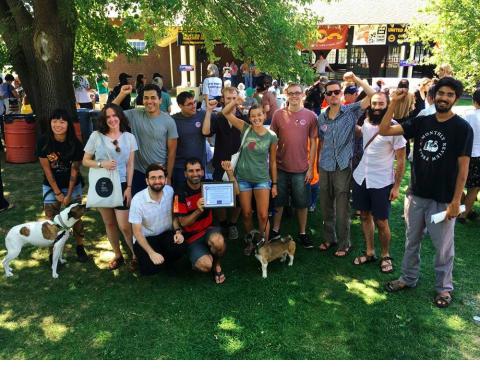NLRB says grads are workers
“Graduate students can unionize at private colleges,” the Wall Street Journal reported. “Graduate students are employees,” according to the National Labor Relations Board, said a headline from the National Public Radio website. A headline from Law360, whose staff had just overwhelmingly voted to unionize, said that the new NLRB ruling “blurs [the] line between students [and] employees.”
 |
Last August, a long-anticipated decision by the NLRB recognized private-sector graduate student teaching assistants and researchers as employees, thus enabling them to form employer-recognized unions. The news thrilled labor activists. Mainstream media picked up the story, but headlines broadcasting the victory for “graduate students” rather than “employees” reveal a fundamental misunderstanding of the discussion that has brought the academic labor movement to its victorious moment.
THE OLD RULING
In debates over whether private universities should recognize graduate employee labor organizations, the anti-union opposition has often resorted to the notion that graduate students are just that – students, and that the work they perform in classrooms with undergraduates or the research they perform for full-time faculty is not real labor but rather educational training for their future academic work. This was, in fact, the argument the NLRB ruled in the 2004 Brown decision the board recently overturned.
Academic unions have rejected that viewpoint, and the majority of the NLRB panel tossed out the previous decision’s argument that collective bargaining between student workers and the university would “improperly intrude into the educational process.” The board wrote, “Thus, we hold today that student assistants who have a common-law employment relationship with their university are statutory employees under the [National Labor Relations Act]. We will apply that standard to student assistants, including assistants engaged in research funded by external grants.”
Graduate employee labor organizations have often said they are not looking to unionize graduate students in their educational capacity, but in the role of performing labor for the university for which they are being compensated, as an undergraduate who works part-time in the campus library or in a dining hall would be. The idea that this labor shouldn’t be treated as traditional labor and rather as training for a future job runs afoul the notion that many jobs include some kind of training for the future.
The NLRB ruling has special resonance in New York City. New York University graduate employees had fought for years for recognition since the Brown decision relieved the administration of responsibility to bargain, although in December 2013 the union won a recognition vote the university allowed outside of the normal NLRB process, thanks in large part to worker and community pressure on the NYU administration. And the case that brought about the overturning of the Brown decision came to graduate employee labor groups based at Columbia University and the New School.
Travis Sweatte, a PhD student in sociology at the Graduate Center who had organized with the Graduate Student Organizing Committee while getting his master’s at NYU, said that operating under the Brown regime taught rank-and-file workers how to organize in a grassroots fashion. “It was just graduate workers going to each department in the college and literally going to people sitting in a lounge and studying there, asking them if they had a moment to talk about the union, about the problems that they are dealing with and explaining how unionization can help them,” he said.
GRASSROOTS ORGANIZING
Sweatte said he hoped to bring that grassroots organizing structure to the Graduate Center. “Our main idea is getting the constituency in the PSC that has been represented but feel as if they are not a main part of the PSC to build a self-sustaining organizational structure,” he said.
Academic labor activists and observers believe the ruling will lead to a wave of energized organizing nationwide.
INCREASED UNIONIZATION
“It is likely that we will see a large increase in unionizing efforts by teaching and research assistants on private-sector campuses, now that those efforts are protected under federal labor law,” said William Albert, executive director of the National Center for the Study of Collective Bargaining in Higher Education and the Professions at Hunter College. “Without those statutory protections, unionization of teaching and research assistants is only possible through voluntary recognition by the institution.”
Albert believes that most colleges and universities around the country will accept the ruling and not interfere in organizing campaigns. “Some institutions might try to challenge the ruling,” he said. “Such legal challenges are unlikely to be successful.”
The bigger issue for academic labor in this new environment is publicizing how valuable the work these individuals do is for colleges and universities. “The truth is, graduate workers are the glue that holds higher education institutions together,” said American Federation of Teachers President Randi Weingarten after the decision came out. “Without their labor, classes wouldn’t get taught, exams wouldn’t get graded and office hours wouldn’t be held.”

